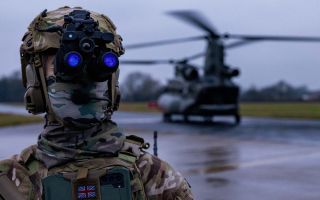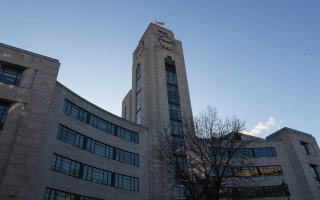Axing Albion and Bulwark would have immense impact on Royal Marines, former chief warns
The Defence Secretary has said the future of the Royal Navy's amphibious assault ships, HMS Albion and HMS Bulwark, are under review again, and asked the First Sea Lord for a plan to 'take forward' the work of the Marines.
The Sitrep podcast spoke to a former Commandant General of the Royal Marines on how the UK would cope without the corps - listen to the full podcast here.
A former head of the Royal Marines has warned the Government's rumoured plans to retire HMS Albion and her sister ship HMS Bulwark would create "real difficulty" for the corps.
Major General Buster Howes, a former commandant general of the Royal Marines, told the Sitrep podcast the move to axe the ships was "about money".
"This is not about clear-sighted logic," he said.
He added: "The defence budget is squeezed and squeezed and squeezed and this is about money. Make no mistake, they're trying to make ends meet with inadequate funds."
HMS Albion and HMS Bulwark are the Royal Navy's Landing Platform Docks, designed to deliver the punch of the Royal Marines to land by sea or by air.
The two ships, which are 176 metres long, can carry four big landing craft (Landing Craft Utility or LCU) inside their floodable well docks, plus four smaller landing craft hanging from the sides (Landing Craft Vehicle Personnel or LCVP) – crucial to commando operations.
Maj Gen Howes told the podcast in war "you have to spit, not dribble", with the two ships "central to amphibious operations".
He said axing them would have a "profound effect on Britain's ability to project force ashore".
He said the Royal Marines' primary commando role is the projection of force ashore - and without the LPDs there would be real difficulty.
"We went to war in the Falklands on things like the Canberra, on ships taken up from trade," he said.
"It's just not an act of war, going to a place of conflict in a civilian ship."
Maj Gen Howes explained that in order to establish a beachhead ashore, you need to have a "credible and competent force".
"You go where the enemy isn't, but you only have so much time to build up your combat power," he said.
"Those two ships are… central to credible amphibious operations.
"Deleting them now would have - I mean there's no way of spinning it - would have an immense impact."
Earlier this week, Defence Procurement Minister James Cartlidge said "no final decision" had been made on the future of the ships.
While the Defence Select Committee announced it intended to hold an evidence session in the coming weeks amid reports that Defence Secretary Grant Shapps is considering axing the vessels.
Mr Shapps was also forced to deny reports he is set to ask the Royal Marines to justify its existence, after telling MPs the force was "absolutely essential".
Some have argued when hard decisions have to be taken, the UK could do without troops trained for amphibious assault and Britain's capability to parachute in airborne troops can deliver the same effects.
Maj Gen Howes refused to run down the role of the Army's Parachute Regiment in order to defend the Royal Marines, but did say "you can only jump with what you can carry".
"You can chuck a pallet out of the back of an aircraft with stuff on it, but an aircraft can only carry a limited amount, and so the Parachute Regiment are there for 24 hours before they need to be reinforced," he said.
"I don't see it as either/or. I'm not going to make a case against the Parachute Regiment in order to justify the Royal Marines.
"That's a sort of nil sum game which is idiocy. They have different functions. But… they're both forcible entry troops.
"They're both designed for assault rather than defence.
"But, you know, a 19,000 tonne ship can carry enormous amounts of ammunition, food, and materiel. It doesn't just have utility in warfighting.
"Grant Shapps has recently been talking about alleviating the absolutely unconscionable suffering in Gaza and… possibly providing humanitarian supplies across the beach at Gaza, which the Israelis control.
"The LPDs would be absolutely central to that because you've got to secure it. That is a highly unstable and dangerous environment.
"You're not just going to drive trucks ashore. You're going to have to establish a beachhead and protect it and then get all that ashore… there's a perfect example of the utility of these things."
The award-winning Sitrep podcast brings you discussion and analysis on defence, foreign policy and the stories affecting the British forces - presented by Kate Gerbeau, with expert analysis from Professor Michael Clarke.
Listen to the full Sitrep podcast on Youtube here or wherever you get your podcasts.









